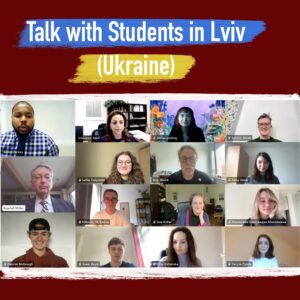
One week ago, our students had the chance to talk with four Ukrainian students from Lviv via Zoom. The talk was facilitated by Dr. Randall R. Miller, Senior Consultant to the Chancellor of the Wayne County Community College District, with the support of the Chancellor of WCCCD and Bob Wood, Professor at the Catholic University in Lviv, in cooperation with our program. Four Ukrainian students, Sofiia, Olha, Kassandra, and Yaryna shared their experiences with studying in a war-torn country. Our Dickinson-in-Bremen students shared their thoughts after the talk:
“What struck me most was the normalization of the students’ experiences. Much like many people in the west have likely grown numb to seeing updates about the war in Ukraine in the news, the Ukrainian students and their professors no longer react to air sirens like they did at the beginning. It’s heartbreaking that Ukraine has been exposed to war for so long that it has settled into daily life like any other routine.” (McKenna Hillman)
“The part that stuck with me most about hearing the Ukrainian students speak is how they have had to get used to so many horrific things. The students discussed their daily lives as consisting of daily bomb threats and sirens, frequent reminders of the fallen, general fear for loved ones, and an inability to make plans for the future. At the same time, it took them time to articulate what living in a war is like, often iterating that it just feels like normal life now.” (Abby Jones)
“It is a sobering experience to listen to current students of University in the country of Ukraine. They are similar to my peers and I, with the responsibility of school and their personal lives. But they live in constant fear of violence, whether it be inflicted on them or their family or their friends.” (Riley Robinson)
Learning about how life amidst a war has been normalized to a degree through these students was both fascinating as well as deeply concerning. I was particularly struck by the students’ description of their current reactions to air raid sirens as opposed to when the war was just beginning as well as some University classrooms doubling as bomb shelters. I recall one student saying she sometimes didn’t even react to bomb warnings and simply stayed in her apartment because it had become a normal part of her life at this point. (Grear Boyd)
“The meeting with Ukrainian students really demonstrated the reality of the impacts of the war, the day to day impacts on individuals are covered less by the international media so it was interesting to hear their perspectives, especially about continuing their lives with a semblance of normalcy amidst the chaos and terror of war.” (Gabe McGough)
Afterwards, the Dickinson students as well as the students from Ukraine had the opportunity to attend a talk by Dr. Ludwig, titled: “The War in Ukraine explained. An Update after Two Years,” which was followed by a Q&A session.
“While I found many aspects of Dr. Ludwig’s Ukraine talk interesting, I was particularly intrigued by her explanation of the role that social media continues to play in the ongoing conflict both on Russian and Ukrainian sides. Specifically, Russian use of misinformation to continue to justify aggression towards Ukraine was of interest. Yet, as I have seen these videos myself on my personal social media accounts, I was particularly captivated by the discussion of Ukrainian use of popular media platforms to spread awareness of inadequacies of the Russian military in order to both rouse international support for their defense efforts and to promote national morale.” (Grear Boyd)
“I found both our conversation with the students from Lviv and Dr. Ludwig’s talk incredible. Not only did I get to talk with students, folks my age, experiencing the war first hand as their day to day, I got to understand the war, tactics and its current status much better than I ever would have. I think what struck me most was how normalized war was for the Ukrainian students – one girl apologized for being so tired, as there had been air raid sirens all night and she had classes in the morning, in the same tone I might complain about the weather.” (Noah Salsich)
The morning after these talks, Russia launched massive drone and missile strikes on Ukrainian cities – the largest airstrike on its energy infrastructure so far in the last two years of this war.
